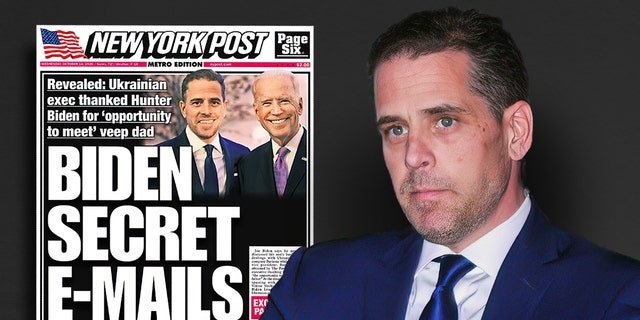International
House Committee Pushes for FBI Testimony on Suppressed Hunter Biden Laptop Story

From Reclaim The Net
Chairman Jordan penned a letter last Thursday, acquired by The New York Post, in which he requested a verbatim transcript from an anonymous FBI employee. The staff member of the FBI purportedly made significant contributions to the bureau’s initiatives to silence factual information linked to the Biden…
|
The House Judiciary Committee, chaired by Jim Jordan (R-Ohio), has expressed keen interest in gathering testimony from an FBI analyst. This specific analyst previously affirmed the legitimacy of Hunter Biden’s laptop – infamously referred to as the “laptop from hell” – to Twitter moderators, even as the social media platform was suppressing The New York Post’s explosive report concerning the device’s contents.
Chairman Jordan penned a letter last Thursday, acquired by The New York Post, in which he requested a verbatim transcript from an anonymous FBI employee. The staff member of the FBI purportedly made significant contributions to the bureau’s initiatives to silence factual information linked to the Biden family’s alleged wheelings and dealings, which emerged shortly ahead of the hard-fought 2020 presidential election.
A substantial part of the Chairman’s letter conveyed disappointment with the FBI’s decision to disregard direct queries from social media platforms regarding confirmation of the laptop’s authenticity, despite owning the laptop for close to a year and having confirmed its content. This action from the bureau allowed social networks to blunt The New York Post’s breaking news based on the inaccurately perceived notion that it was the byproduct of Russian disinformation.
On the road to the 2020 election, bureau officials held numerous meetings – over 30 in total – with Twitter and other key social media channels. Their primary narrative focused on possible Russian operations aimed at divulging damaging information about the Biden family, especially Hunter Biden’s alleged exploitation of his father’s high-ranking position within his lucrative board membership at the Ukrainian energy corporation, Burisma Holdings.
When an article exposing Hunter Biden’s introduction of a Burisma executive to his then-vice president father surfaced on Twitter on October 14, 2020, it was promptly stifled. This occurred despite an FBI analyst airing the laptop as “real” during a separate call with Facebook, before interruption by a member of the bureau’s General Counsel’s Office.
Other communications clarified that there was no evidence to imply Hunter Biden’s laptop was instigated by Russian misinformation. These disclosures, unfortunately, were left unmentioned in their dealings with Twitter, Facebook, and Google. Due to these strategic omissions, Chairman Jordan pointed out, social media platforms perpetuated stymieing the narrative, leaning on earlier cautions issued by the FBI.
The FBI, atypically reticent, validated the materials on Hunter Biden’s discarded laptop, according to testimony provided to the House. Despite these revelations, service members hailing from within the bureau professed unawareness about its origins.
Parallel to these events, 51 preceding intelligence officials distributed a letter disparaging The New York Post’s coverage of emails secured from Hunter Biden’s laptop; a move triggered by a call between then-advisor to the Biden campaign, Antony Blinken, and ex-CIA Director Michael Morell. They reasoned that the emails bore the hallmarks of a conventional Russian information operation which was used to push for online censorship.
|
International
Identities of wounded Guardsmen, each newly sworn in

The two West Virginia National Guard members critically wounded in Wednesday’s ambush near the Farragut West Metro Station have now been identified as Andrew Wolfe and Sarah Beckstrom — young soldiers who had taken their oaths less than a day before gunfire erupted on a downtown Washington sidewalk.
Wolfe, 22, was identified first after Musselman High School in Inwood released a statement confirming the alumnus was one of the soldiers struck. The school said the community was “deeply saddened” and urged residents to pray for him. Wolfe was rushed into surgery and remains in critical condition.
Support poured in across the Eastern Panhandle throughout the day. Friends shared old photos and messages urging him to “keep fighting.” Wolfe, who lives in Martinsburg, is active in the region’s cornhole community, and the Beltway Baggers — organizers of ACL tournaments in Virginia — posted a photo of him flashing a peace sign while asking members to pray for his recovery. “He was shot today while serving our country,” the group wrote.
Federal officials identified the second Guardsman on Thursday as 20-year-old Sarah Beckstrom. U.S. Attorney Jeanine Pirro said Beckstrom had just taken her oath of enlistment and was barely a day into her service when she was gunned down. She underwent emergency surgery and remains in critical condition.
According to investigators, 29-year-old Rahmanullah Lakanwal — an Afghan national admitted to the U.S. following the Kabul evacuation — allegedly stepped from behind a corner and opened fire at close range as the two patrolled under a heightened security directive in the capital. Beckstrom was hit first. Wolfe was shot moments later.
Pirro said both families are at the hospital as doctors fight to keep the soldiers alive. She warned that if either succumbs to their injuries, prosecutors will pursue a first-degree murder charge. “If one of them is to pass — and God forbid that happens — this becomes murder one. That’s it.”
Pirro urged Americans to pray for the wounded Guardsmen. “On a day when families gather together, I ask you to pray for these two young people — that they survive.”
International
Afghan Ex–CIA Partner Accused in D.C. National Guard Ambush

In what FBI Director Kash Patel called a “heinous act of terrorism,” senior U.S. officials say they have opened a “coast-to-coast” investigation into the gunman who opened fire on two National Guard members just blocks from the White House — an Afghan man who had worked with a Central Intelligence Agency–backed paramilitary unit during the war in Afghanistan and later resettled in the United States under a Biden-era evacuation program. The case is likely to further energize the Trump administration’s already robust deportation drive and its expanded checks on immigration.
The suspect, identified as 29-year-old Rahmanullah Lakanwal, allegedly ambushed two members of the West Virginia National Guard outside the Farragut West Metro station around 2:15 p.m. Wednesday, in a busy commercial district a short walk from the presidential compound. Both soldiers remain in critical condition after emergency surgery, and the gunman was also wounded before being taken into custody, officials say.
Patel said his teams are investigating the attack as a “heinous act of terrorism,” which other officials have suggested could involve international terrorist networks, though they say the assailant appears to have acted alone.
CIA Director John Ratcliffe said Thursday that Lakanwal had previously worked alongside U.S. forces in Afghanistan. “He previously worked with the U.S. government, including CIA, as a member of a partner force in Kandahar,” Ratcliffe said, describing a unit that operated with American support until the collapse of the U.S.-backed Afghan government in 2021.
According to the Department of Homeland Security and multiple law-enforcement officials cited in U.S. media reports, Lakanwal entered the United States in September 2021 under Operation Allies Welcome, the Biden administration program that airlifted tens of thousands of Afghans who had worked with U.S. forces and feared Taliban reprisals. He later applied for asylum and was granted it after President Donald Trump returned to office. Officials say he had no known criminal history and had most recently been living in Washington State, where a relative told NBC News he was working for Amazon.
NBC, citing a family member, also reported that Lakanwal served for roughly a decade in the Afghan army, including deployments in Kandahar alongside U.S. Special Forces. Those details cut to the heart of a politically explosive question in Washington — whether a man once trusted enough to fight alongside U.S. paramilitary personnel slipped through vetting as the Afghan war ended, or whether a former ally became radicalized after he arrived in America.
Officials say Wednesday’s attack unfolded in seconds. Two West Virginia Guard soldiers, part of a domestic security deployment ordered by Trump earlier this year, were on a “high-visibility patrol” near the entrance to Farragut West when a man rounded a corner, produced a handgun and opened fire without warning.
According to detailed accounts from federal officials and witnesses, the first victim — identified by U.S. Attorney Jeanine Pirro as Sarah Beckstrom — was struck almost instantly and collapsed to the pavement. Pirro told reporters the alleged assassin was armed with a .357-caliber revolver and said that after shooting one of the victims, he “leaned over and shot him again.”
After exhausting his ammunition, the gunman allegedly grabbed the fallen soldier’s weapon and continued firing, wounding a second Guard member — Andrew Wolfe — before other troops and officers subdued him in a brief but chaotic struggle that involved both gunfire and a knife.
Reacting sharply to a reporter’s question about whether the Trump administration should have deployed National Guard units to city streets, Pirro replied that the Guard is necessary, adding that their presence “saved lives.” As officials left the news conference, Pirro brushed off a final question about whether the suspect was part of a radicalized Islamist network, saying only: “We won’t go there.”
Yesterday the Secret Service briefly locked down the White House as sirens converged on one of downtown Washington’s busiest commuter arteries. Witnesses told reporters they heard a short burst of shots followed by more sustained firing, then watched people flee into side streets and cafes as emergency vehicles arrived.
The FBI’s Joint Terrorism Task Force is leading the investigation. Law-enforcement officials say they are examining Lakanwal’s digital footprint, communications and travel history, and working with intelligence agencies to retrace his time in Afghanistan and the United States. Patel said FBI teams had conducted searches overnight on numerous electronic devices found at properties associated with the suspect — including in San Diego and in Washington State.
“You miss all the signs (of danger) when you do zero vetting,” Patel told reporters when asked if the Biden administration had erred in admitting the suspect.
In a televised address from his Mar-a-Lago resort late Wednesday, President Trump framed the attack as proof that his immigration hard line is justified. Calling the shooting “a heinous assault” and “an act of evil, an act of hatred, an act of terror,” Trump said the United States “will not put up with these kinds of assaults on law and order by people who shouldn’t even be in our country.”
He pledged to “re-examine every single alien who has entered our country from Afghanistan under Biden” and vowed that “the animal who perpetrated this atrocity” would pay “the steepest possible price.” Shortly afterward, U.S. Citizenship and Immigration Services announced that it has halted processing of all immigration requests relating to Afghan nationals — including asylum applications, permanent-residency cases and new entries — “pending further review of security and vetting protocols.”
According to an internal USCIS memo previously obtained by CBS News, the Trump administration had already directed immigration officials to review the cases of all refugees admitted during the Biden years, a cohort of roughly 233,000 people from multiple countries. Now, Afghans are facing an explicit freeze, with no end date. Meanwhile, Vice President J.D. Vance amplified the hard-line message, writing on X that the shooting proved critics of Biden’s Afghan-refugee policy wrong and declaring: “We must redouble our efforts to deport people with no right to be in our country.”
The Bureau is a reader-supported publication.
To receive new posts and support my work, consider becoming a free or paid subscriber.
-

 Business2 days ago
Business2 days agoBlacked-Out Democracy: The Stellantis Deal Ottawa Won’t Show Its Own MPs
-

 Agriculture2 days ago
Agriculture2 days agoHealth Canada pauses plan to sell unlabeled cloned meat
-

 Crime2 days ago
Crime2 days agoB.C.’s First Money-Laundering Sentence in a Decade Exposes Gaps in Global Hub for Chinese Drug Cash
-

 Crime2 days ago
Crime2 days agoFBI Seizes $13-Million Mercedes Unicorn From Ryan Wedding’s Narco Network
-

 Banks2 days ago
Banks2 days agoThe Bill Designed to Kill Canada’s Fossil Fuel Sector
-

 International2 days ago
International2 days agoAmerica first at the national parks: Trump hits Canadians and other foreign visitors with $100 fee
-

 armed forces1 day ago
armed forces1 day ago2025 Federal Budget: Veterans Are Bleeding for This Budget
-

 Business2 days ago
Business2 days agoFederal major projects list raises questions








